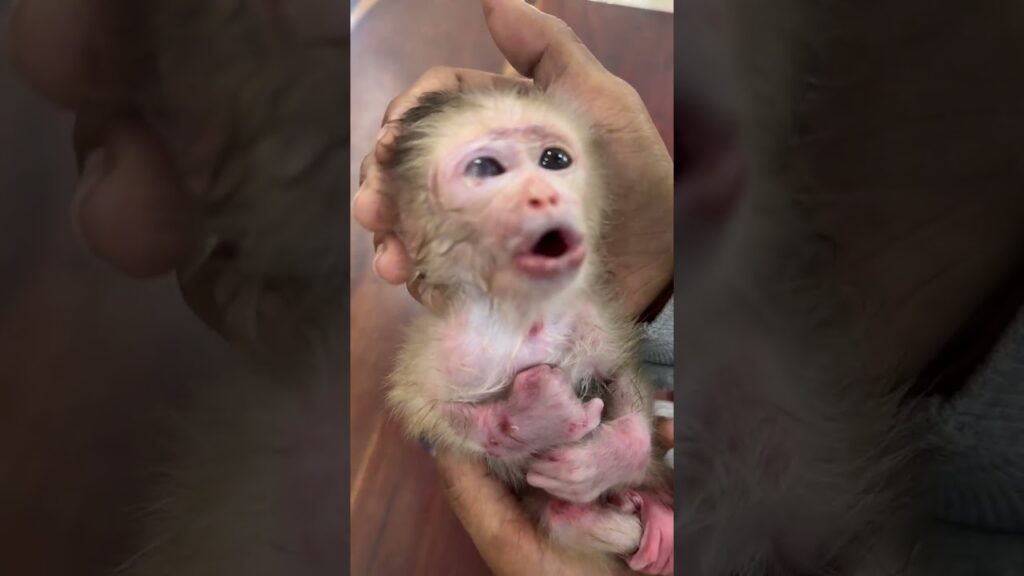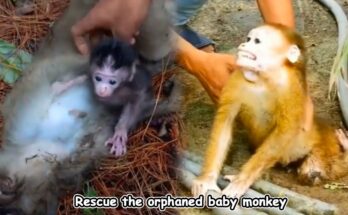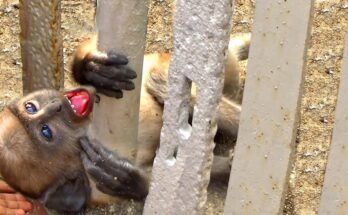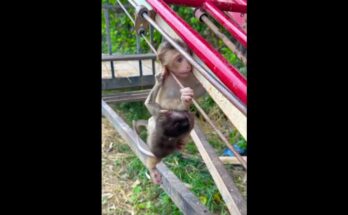In a tale of resilience and compassion, a baby monkey named Kiko is defying the odds after a devastating injury left him paralyzed from the waist down. The tragic accident, which occurred in the wild before Kiko was rescued, could have ended his life—but thanks to the quick actions of rescuers and the dedication of wildlife rehabilitation specialists, Kiko is now receiving the life-saving care he so desperately needs.
Kiko, estimated to be around six months old, was found alone and motionless at the base of a tree by a team of conservation workers during a routine field survey in a protected forest region. At first, they believed he was sleeping or hiding. But as they got closer, it became clear that something was terribly wrong. The tiny monkey wasn’t moving his legs and could barely lift his head. He had likely fallen from a considerable height, or worse, been injured by a predator or human interference.

“It was heartbreaking,” said Dr. Lena Torres, a wildlife veterinarian who has since taken over Kiko’s care. “He was so small, so vulnerable—and clearly in pain. But he still had that spark in his eyes, as if he knew we were there to help.”
Kiko was immediately transported to a nearby primate rescue center, where X-rays and scans confirmed that his spinal cord had been damaged, resulting in partial paralysis. The injury meant he could no longer use his lower limbs, and without intervention, he wouldn’t survive in the wild—or even in captivity without significant care.
That’s when the team at the sanctuary mobilized. With support from international veterinary partners and animal welfare organizations, a tailored treatment plan was created. Kiko began receiving physical therapy, anti-inflammatory medication, and daily massages to stimulate nerve function and prevent further muscle deterioration. Specialized equipment was built to help him move, including a tiny mobility cart—essentially a wheelchair designed just for him.
The staff and volunteers affectionately call him “the little warrior.” Though his recovery will be long and uncertain, Kiko has already made remarkable progress. He has regained some movement in his upper body, allowing him to feed himself and interact with other baby monkeys under close supervision. His spirit remains strong, and he has formed a touching bond with one of his caretakers, often reaching out for cuddles and gently chattering in delight when she enters the room.
“Kiko teaches us every day what it means to fight,” Dr. Torres shared. “He may never walk again, but he’s learning to live in a new way, and he’s surrounded by people who love him.”
Plans are underway to build a special enclosure suited for Kiko’s needs, where he can live safely while continuing rehabilitation. The sanctuary also hopes that his story will raise awareness about the dangers young primates face in the wild—from deforestation to human conflict—and the importance of protecting and rehabilitating injured wildlife.
Though his journey is just beginning, Kiko’s resilience and the love surrounding him serve as a powerful reminder: even in the wake of tragedy, hope and healing are possible.


